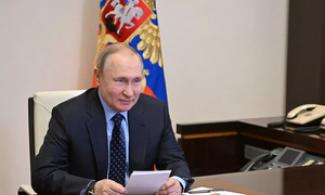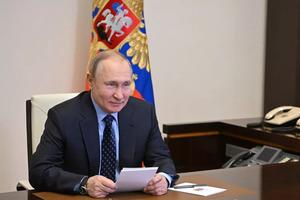
Sweden and Finland are members of the EU, but not NATO, and the latter shares an 830-mile border with Russia.
Russia says a nuclear-free Baltic region would no longer be possible if Finland and Sweden join NATO, alluding to additional nuclear deployments in Europe.
“If Sweden and Finland join NATO, the length of the alliance’s land borders with the Russian Federation will more than double. Naturally, these borders will have to be strengthened,” Dmitry Medvedev, former president and deputy chairman of Russia’s Security Council, wrote on his official Telegram channel on Thursday.

Russia will have to “seriously strengthen the grouping of land forces and air defence, deploy significant naval forces in the waters of the Gulf of Finland. In this case, it will no longer be possible to talk about any nuclear-free status of the Baltic - the balance must be restored,” he said.
The comments, CNBC reports, come a day after Finland and Sweden said their decision on whether to apply for NATO membership would come within a matter of weeks. The countries’ leaders said their security assessments had dramatically changed following Russia’s invasion of Ukraine in February.
The Baltics, which includes the north-eastern European countries of Lithuania, Latvia and Estonia, are members of the EU and NATO. Sweden and Finland are members of the EU, but not NATO, and the latter shares an 830-mile border with Russia.
If Finland and Sweden did join NATO, this would give Moscow “more officially registered opponents,” Medvedev added. He claimed that NATO was planning to admit the two Nordic states with “minimal bureaucratic procedures.”
Russia’s response should be taken with “no emotion, with a cold head,” he added.
Moscow sees neighbouring Finland’s potential inclusion in NATO as a threat to its national security, as the U.S. could deploy advanced military equipment in Finland if it joined the alliance.
Lithuania, which borders the Russian exclave of Kaliningrad, brushed off Medvedev’s comments on Thursday.
It’s “nothing new,” Lithuanian Prime Minister Ingrida Simonyte said. The country’s Defence Minister Arvydas Anusauskas added that Russia already has nuclear weapons in the Baltic region.
“The current Russian threats look quite strange, when we know that, even without the present security situation, they keep the weapon 100 km from Lithuania’s border,” Anusauskas was quoted by Lithuania’s BNS wire as saying.
“Nuclear weapons have always been kept in Kaliningrad ... the international community, the countries in the region, are perfectly aware of this ... They use it as a threat,” he added.
Kaliningrad, which is slightly larger than Connecticut, borders the Baltic sea on its west and is sandwiched between NATO members Poland and Lithuania.
Moscow’s invasion of Ukraine has triggered a U-turn in Finnish public opinion on joining the 30-member military alliance, which it has refrained from joining since World War II in a bid to maintain neutrality. Moscow has in the past warned of severe consequences and instability in the Nordics if Finland were to join.
If Finland joined the alliance, Sweden would likely follow suit. Finland and Sweden, as well as Ukraine, are already “Enhanced Opportunity Partners” of NATO, the closest form of partnership with the alliance, and partake in military exercises with NATO states.
Rather than urging the countries to pursue membership, NATO Secretary-General Jens Stoltenberg has repeatedly said it is for Finland and Sweden to decide their own path. He has also said “the door remains open” for the alliance to welcome new members.
But Russia has long warned against any enlargement of NATO, reportedly accusing the alliance of being “a tool geared towards confrontation.”
Ahead of its invasion of Ukraine, it demanded that the organisation, which was created in 1949 in response to the threat posed by the Soviet Union, return to its pre-1997 borders — something the U.S. and NATO refused.
Fourteen countries have joined the collective defence alliance since 1997, accounting for nearly half of its members. These countries include much of central and eastern Europe, and the first NATO members to border Russia and its exclave territory of Kaliningrad: Poland, Latvia, Lithuania and Estonia.
Moscow blames Ukraine’s pursuit of NATO membership, among other things, for triggering the Russian invasion, saying it threatened Russia’s security. NATO leaders have reiterated that they will not send troops into Ukraine to help in their fight against Russia, primarily because the country is not a member of the alliance.